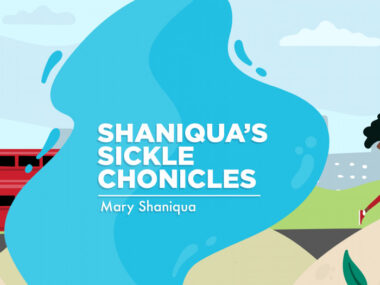Preventing and managing a sickle cell pain crisis during Christmas
Avoiding potential triggers is key to enjoying the holiday season
Written by |

Christmas has grown beyond its origins as a Christian celebration of Jesus’ birth. It now unites communities and fosters a sense of togetherness across cultural backgrounds, religious beliefs, and geographical locations. The unique culture of Christmas, with its twinkling lights, festive decorations, and colorful trees adorned with ornaments, along with the joyous music and family gatherings, makes it a highly anticipated occasion for almost everyone.
Throughout my childhood, Christmas held a special place in my heart as my favorite holiday. I eagerly anticipated the next Christmas from the beginning of each new year for various reasons. Firstly, it was a time when I could count on receiving new clothes, even if my parents were facing financial challenges. They always found a way to make it happen. Secondly, I looked forward to the presence of my friends and cousins who would gather during Christmas, creating cherished memories together. Additionally, our church had a special program, which I eagerly awaited and enjoyed.
As I grew older and school responsibilities took a toll on my health, holidays like Christmas became a much-needed break from the stresses of academia. Furthermore, there came a point when my sister and I took charge of decorating our house for Christmas, which became another aspect I eagerly anticipated.
However, amid all the excitement and anticipation, there was also a sense of fear associated with Christmas for me. As a person with sickle cell disease, I knew my likelihood of experiencing a pain crisis increased during this time. Unfortunately, this realization often made me a bit anxious about Christmas.
Christmas and sickle cell crises
The prevalence of sickle cell crises during the holidays can be attributed to several factors. Firstly, the occurrence of Christmas during the winter or harmattan (dry, dusty) season, depending on geographical location, exposes individuals to cold weather. Cold temperatures constrict blood vessels, reducing blood flow and increasing the chances of a crisis. The dryness and dehydration associated with cold weather can also trigger sickle cell crises.
Another reason behind the increased frequency of pain crises during Christmas is the heightened excitement and physical activity typically associated with the holiday. Both emotional excitement and overexertion can trigger sickle cell crises.
Additionally, larger social gatherings during Christmas expose individuals to a higher risk of infections, which can further exacerbate crises.
A crisis to remember
One of my most memorable holiday crises occurred when I was 8. Despite being excited about my new Christmas outfit and the presence of my cousins and friends, I found myself struck by a severe sickle cell crisis on Christmas Day. The pain in my legs was excruciating, and I could barely walk. My sister stayed with me, gave me drugs, and massaged my legs.
However, determined not to let my beautiful dress go to waste, I managed to make my way to church, limping and in agony, even if it was only for a brief moment, before returning home. Though my pain persisted, I felt a sense of accomplishment in showcasing my Christmas attire and witnessing the joyous faces in the church. My mum saw me and sent me back home.
Preventing frequent crises during Christmas
As I grew older, I learned to mitigate the frequency of crises during the holidays by taking certain precautions. Keeping warm, staying indoors when necessary, and avoiding excessive physical activity have become essential strategies for me and my family. Moreover, I’ve learned to manage my emotions and minimize excitement, mindful of its potential to trigger a crisis. Understanding my limitations and knowing when to rest have played a significant role in maintaining good health for me. Additionally, drinking plenty of water helps me prevent dehydration that triggers crises.
Navigating social gatherings responsibly and taking precautions to minimize infection exposure is crucial during Christmas. As individuals living with sickle cell disease are more susceptible to infections, I take extra care to avoid crowded spaces, maintain good hygiene practices, and prioritize my health.
For those with sickle cell who wish to engage in physical activities during the holiday season, finding a balance between participation and self-care becomes essential. Listening to one’s body, taking breaks when needed, and pacing oneself can help prevent the onset of a crisis.
It’s vital to remember that having sickle cell disease doesn’t define us or limit our capacity for joy during the holidays. While challenges may arise, it’s possible to create meaningful memories and experience moments of joy amid the difficulties. By keeping warm, staying hydrated, managing emotions, avoiding infections, reducing physical exertion, maintaining a healthy diet, knowing one’s limitations, and prioritizing rest, sickle cell patients can help minimize the occurrence of crises during Christmas and fully enjoy the holiday.
Note: Sickle Cell Disease News is strictly a news and information website about the disease. It does not provide medical advice, diagnosis, or treatment. This content is not intended to be a substitute for professional medical advice, diagnosis, or treatment. Always seek the advice of your physician or other qualified health provider with any questions you may have regarding a medical condition. Never disregard professional medical advice or delay in seeking it because of something you have read on this website. The opinions expressed in this column are not those of Sickle Cell Disease News or its parent company, Bionews, and are intended to spark discussion about issues pertaining to sickle cell disease.






Debra Butler
I am 63 years old and I was 12 years old when I found out that I had Sickle cell Beta Thalassemia and I have educated myself about the disease and I really enjoy this website to learn more about the disease from other most of All making sure that you have a great doctor who is very knowledgeable is very helpful in making sure you they know and understand the disease is very important take care and have a great Holiday